“Do you know what torture it is to go hungry while I am carrying your food on my back?”
Delivery worker Paulo Roberto da Silva Lima posed this question in a video in March, calling out food delivery apps for leaving workers unprotected in the pandemic. Da Silva, better known as “Galo” because as a child he dreamed of having a Sete Galo Honda motorcycle, filmed it on his 31st birthday. He was behind on bills at his home on the outskirts of São Paulo. He got a flat tire while making a delivery, and after fixing it, he opened the UberEats app.
Videos by VICE
“I had been blocked,” he remembers, because a flat tire had delayed the delivery. “I wanted to fight back.”
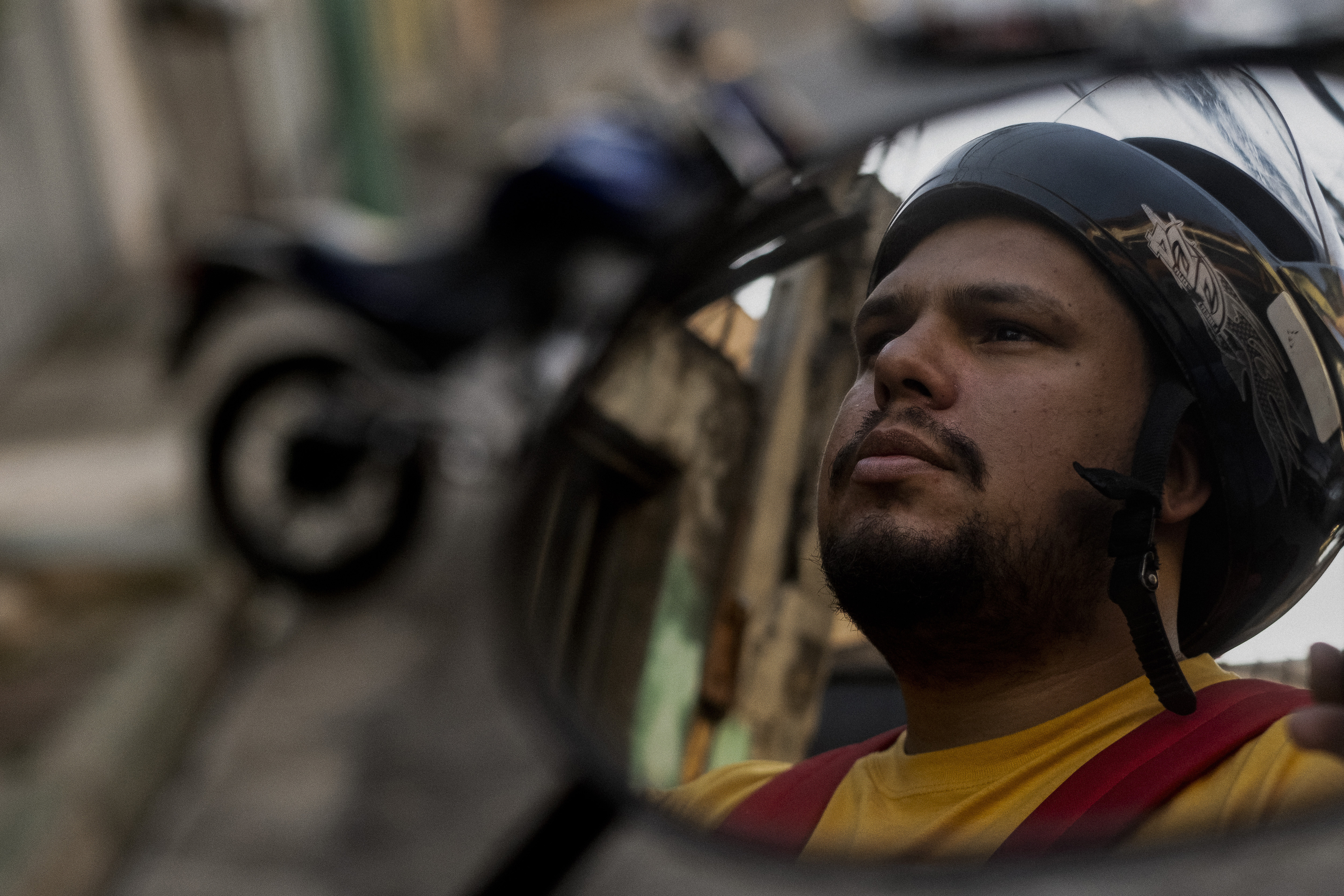
The video went viral on Twitter, Facebook, Instagram, and WhatsApp in Brazil, provoking debate about the working conditions in the gig economy.
Da Silva began organizing other workers, forming the Entregadores Anti-fascistas (Anti-fascist deliverers). He encouraged them to question the working conditions on the apps. “Just because you don’t see your boss doesn’t mean you don’t have a boss,” he would tell other workers. “He’s hiding, counting money. Money that you make, you understand?”
Galo has become the face of a growing labor movement of gig workers in Latin America who are protesting work conditions and pay during the Covid-19 pandemic.
On July 1, thousands of delivery workers in Brazil simultaneously went on strike with their counterparts in Mexico, Chile, Argentina, and Ecuador. They are targeting the global behemoth UberEats, and food delivery apps that have sprung up around the region, including Colombian-owned Rappi, and Brazilian-owned iFood. The growing, decentralized movement is pressuring companies to improve working conditions, and governments to regulate the industry.
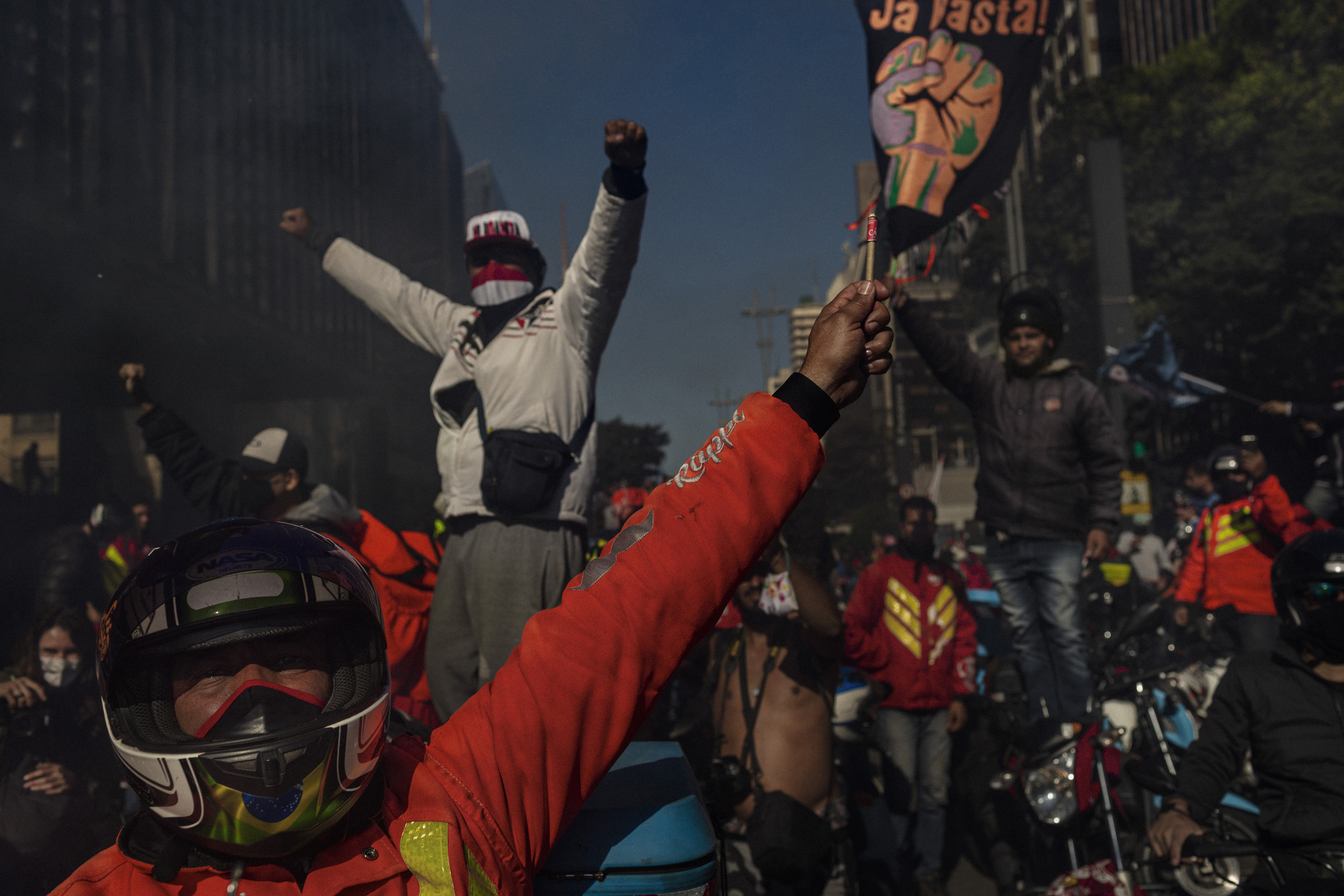
In São Paulo, the July 1 strike drew thousands of workers and supporters. Motoboys and bike delivery workers occupied the central thoroughfare Paulista Avenue, and were joined by students, trade unions, and soccer fans. Their colorful backpacks gleamed in the winter sun, and the workers were joyous, feeling their collective power after daily work in isolation. The smell of gasoline filled the air, as they revved their engines and pulled wheelies. The workers savored a rare moment of dominating the streets. Wearing a delivery backpack, which usually relegates them to the back entrances at restaurants, and stolen naps on park benches, suddenly became a point of pride.
Gerson Cunha of the São Paulo Motoboys Union estimates 5,000 motorcyclists joined the protest. The massive turn-out in Brazil drew media attention, public support and galvanized workers.
Galo calls on workers to see their common interests, instead of seeking personal gain. “I gave up the idea of wanting to get rich so I could change the world,” he says. “The point is to live better, and that means everybody together.”
Regardless of which company they’re working for, the complaints are the same: low pay, long hours, the constant danger of crashes, and now, the threat of the coronavirus.

—
When da Silva became a father in 2017, he turned to delivery work. It was his second stint as a “motoboy,” as they are known in Brazil, but the industry had changed. Now all the work was on apps. He signed up for iFood, Rappi and UberEats, which sell the idea of entrepreneurship and self-employment.
Da Silva says those who deliver by bike have it the worst. They often live on the outskirts of São Paulo, and are Afro-Brazilian or mixed race. He says they ride 15 miles to the city center where demand is high. Sometimes workers sleep on a city bench overnight, too exhausted to ride home.
“Is that entrepreneurship? Is that owning your time?” da Silva asks. “Give me a break.”
Da Silva says that technology companies pit workers against each other. “When I have a problem to solve, you know who I have to solve it with? A telemarketing attendant. Another precarious worker,” he says. “I keep cursing at her, and she keeps cursing at me. And the boss keeps counting money.”
Some motoboys and bike deliverers have resorted to eating at soup kitchens and accepting food handouts. They lay down to rest during the 20-minute breaks some of the apps allow three times per day, and then reconnect to not be penalized for being offline.
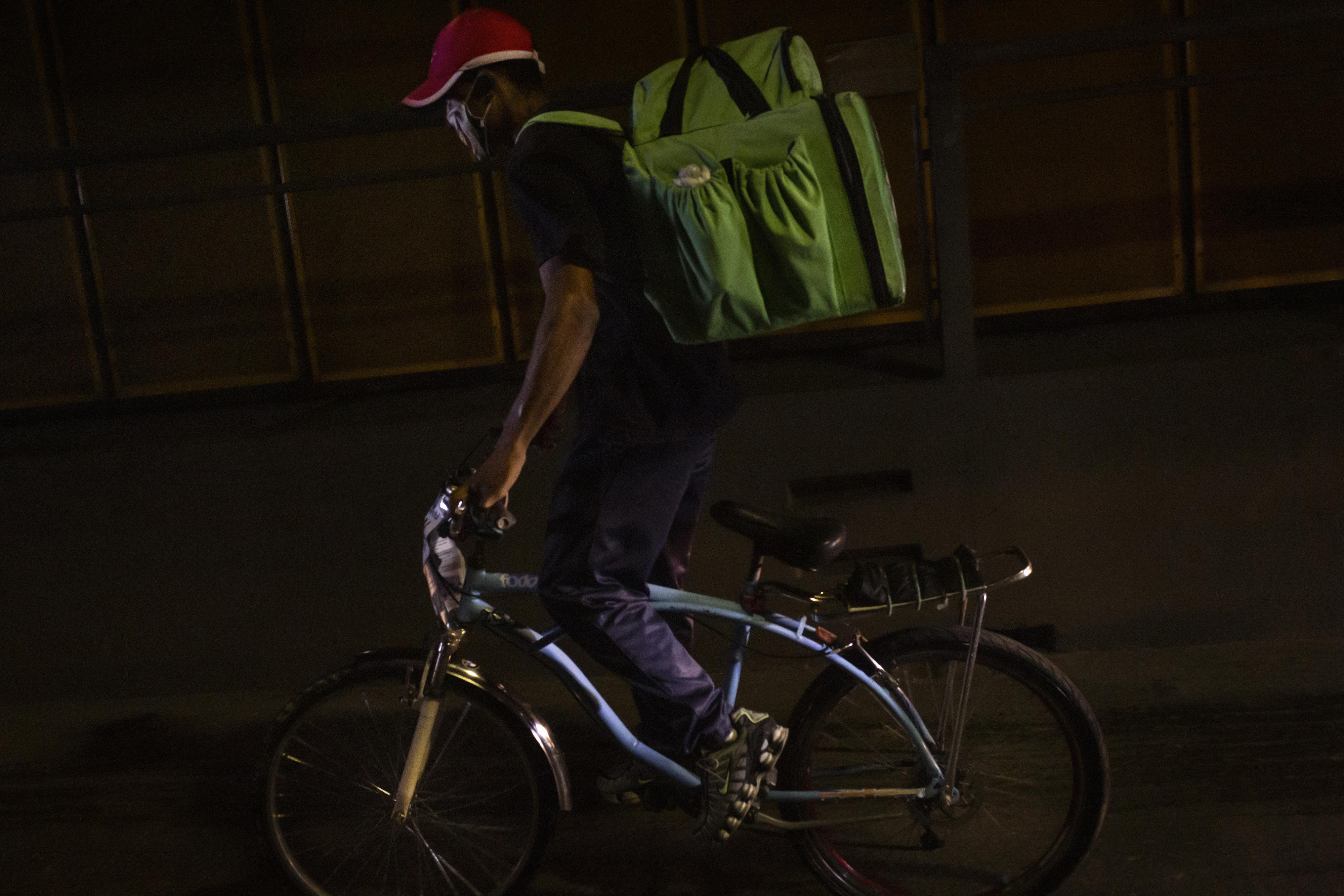
AMABR, the Association of Application and Autonomous Motorcycle Drivers of Brazil, says that delivery workers earn on average between 6 and 10 R$ per hour ($1.15 to $1.91), and work from 10 to 12 hours a day. The motoboys call themselves “cloud people”—always connected, waiting for work, roving the city.
“The pandemic has tripled the number of deliverers,” Da Silva says. “[The companies] have no responsibility to the worker, they can have as many workers as they want. It’s a paradise for them.”
Food delivery was already booming in Latin America, and has only grown in popularity during the pandemic. AMABR estimates there are 50,000 to 70,000 delivery workers in São Paulo, a city of 12 million. One study in Mexico found that orders through Rappi increased 79.67 percent in April 2020 compared to April 2019, and 31.69 percent for Uber Eats in the same time period.
But while demand for delivery is growing during the pandemic, so are the risks. Brazil and Mexico trail only the United States in the number of Covid-19 deaths. More than 100,000 people have died of Covid-19 in Brazil, and about 50,000 have died in Mexico. While Latin America continues to fight the pandemic, delivery workers have no choice but to keep working.
Alexsandro dos Santos Souza was working for “Zé Delivery App,” a Brazilian alcohol delivery company, on April 21, when another motorcyclist hit him on a São Paulo highway.
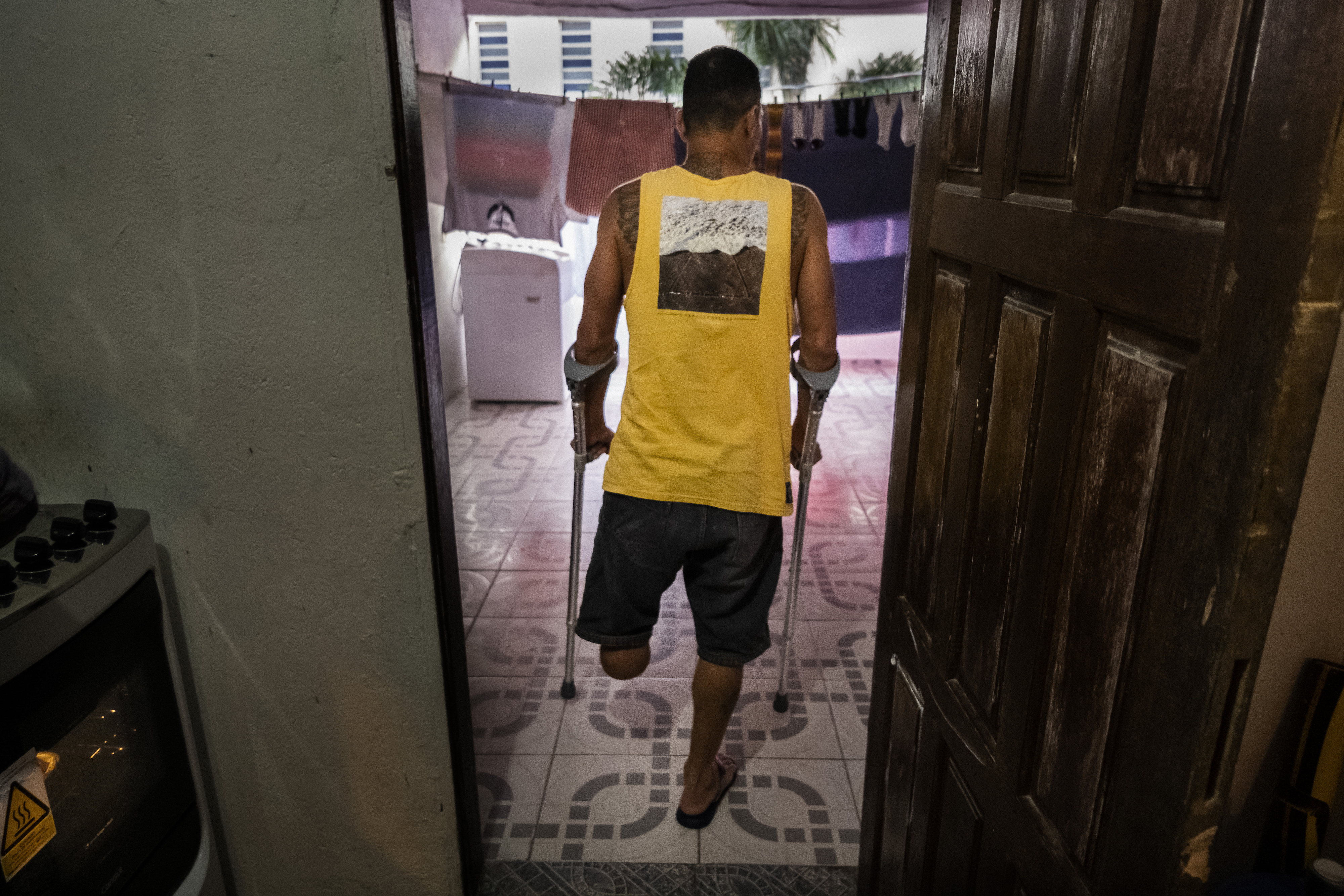
Dos Santos, 45, called friends for help and an ambulance arrived. “I went to the hospital, and they tried to do four surgeries,” he says. “It didn’t work, and they had to amputate my leg.”
Dos Santos has not received support from Ze Delivery. “Even before the pandemic, I worked all day as a delivery worker,” he says. “I would leave at 6 a.m. and come back at midnight, making 1,000 reais a week [$119].”
“You make money but you don’t live,” he says.
According to data from Infosiga, the São Paulo State Traffic Accidents Information Management System, 39 motorcyclists died in traffic incidents in the city of São Paulo in March 2020, compared to 21 during March 2019. In May 2020, 40 died, compared to 29 in May 2019.
The city does not track how many were working for delivery applications. But the São Paulo Motoboys Union says that it has been mostly working motorcyclists on the road during the pandemic, so it is likely a high proportion of those who have died were working for apps.
A study by the Network for Labor Reform Monitoring carried out by several public universities in Brazil surveyed 298 workers, finding that 59% reported lower earnings since the start of the pandemic. The researchers found that before the pandemic, just over half the workers earned more than 520 Reais a week ($98.33). During the pandemic, only 27.2 percent reported that level of earnings.
Da Silva says that after paying for gas and motorcycle maintenance, he aims to take home at least 1,800 Reais a month ($340). “It’s not a good salary,” he says, “but it’s enough to live your life.”
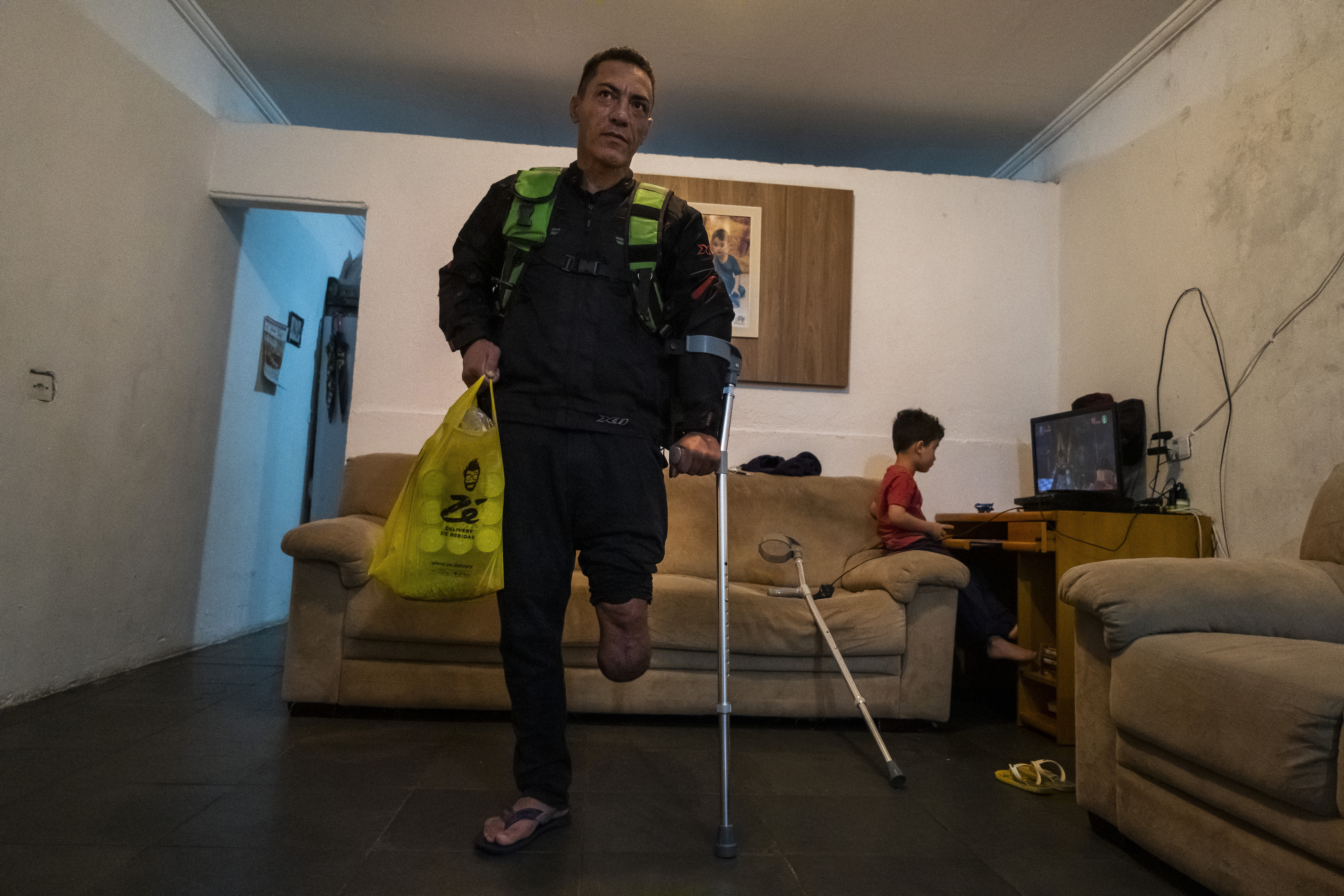
—
As Da Silva and other gig workers were organizing in Brazil, similar protests spread throughout Latin America. On April 22 the first strike was called among workers in Argentina, Ecuador, and Peru. A second strike came on May 29.
In Mexico, workers say they are joining protests because the risks on the road have increased. “In over 100 days of the pandemic, five delivery workers have died,” says Saúl Gómez of the collective Ni un Repartidor Menos (Not One Delivery Worker Killed) in Mexico City. Days later, the collective recorded a sixth death, of an UberEats worker who crashed off a bridge on July 24.
On July 1, Ni un repartidor menos led two protests, hanging white-painted delivery backpacks at the sites of two fatal crashes. The action echoes the white “ghost bikes” that hang in many cities to commemorate cyclist fatalities.
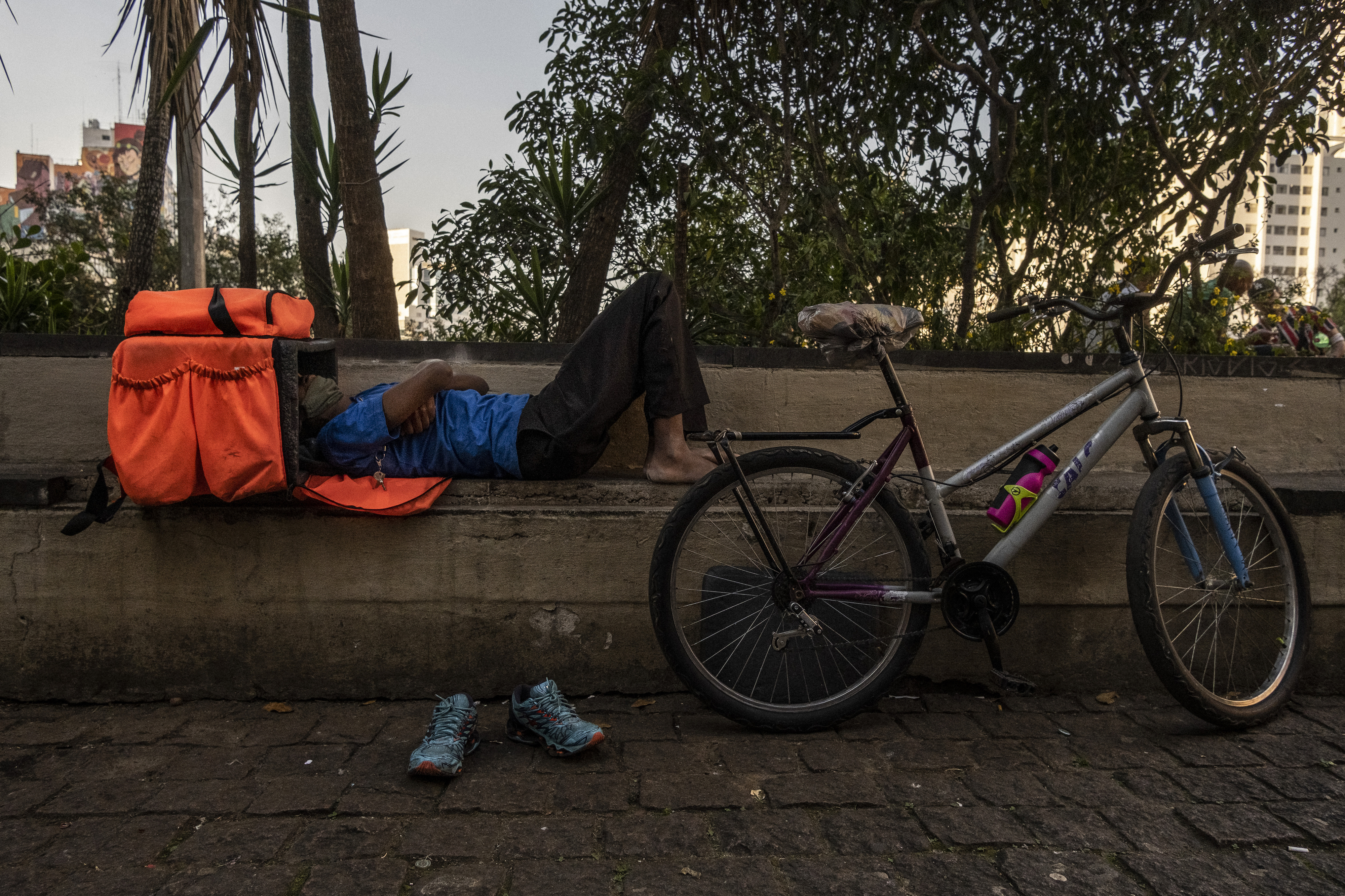
Mexican workers say the companies have not done enough to support workers who have contracted Covid-19. Applications like Rappi have offered to compensate workers for sick time. But Gómez says the documentation requirements are onerous, especially in Mexico where Covid-19 testing rates are the lowest in the region.
Like their counterparts in Brazil, delivery workers in Mexico City also report decreased earnings. Paola Ángel Segura, 24, says that when she started working for Rappi in September 2017, she could earn about 1,000 pesos ($44.87) in four or five days of work. But in the months leading up to the pandemic, she was working six days a week to bring in the same amount.
These conditions have motivated Segura and other workers to join Ni un repartidor menos.

Due to the risk of contagion, Segura has not seen her 6-year-old son, who lives with his paternal grandparents, for over two months. “I feel bad,” she says. “I’ve been missing him a lot.”
“The applications should pay attention to us, because they depend on us,” she says. “They aren’t anything without us.”
—
The strikes have succeeded in attracting attention to working conditions, and putting companies on the defensive. Rafael Grohmann, a professor at UNISINOS in Porto Alegre, Brazil, says that platform companies increased their advertising and lobbying in response to the strikes. “The media showed much more of the companies’ vision, saying that everything is fine, and not the workers’ voices,” he says. “The companies want to co-opt the public debate.”
While geographically dispersed, delivery workers have found ways to connect and organize. “Workers organize using whatever tools are available to them,” says Callum Cant, author of Riding for Deliveroo and former delivery worker in the U.K.
In the case of delivery workers, that’s their bikes and motorcycles, allowing them to gather and dissipate quickly. They also take advantage of smart phones, messaging apps, and social media. The boxy delivery backpack has become their calling card. Brazilian workers stack their backpacks to create barricades in the street, Mexican workers paint them white to memorialize killed colleagues.
“The current situation is escalating struggles led by delivery workers themselves,” says Cant. “These are conditions in which labor movements have always grown.”
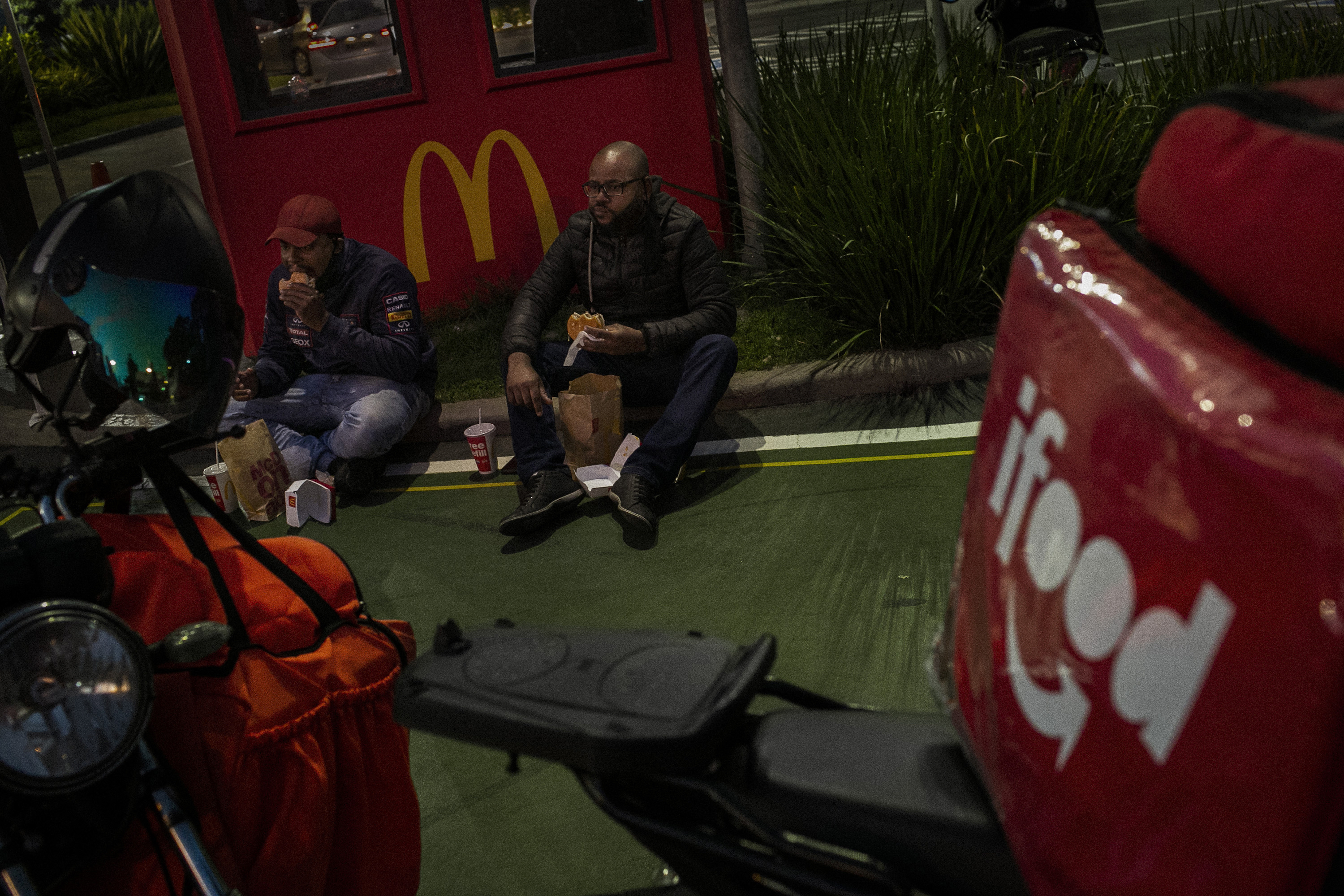
Collectives have been connecting across national borders, organizing YouTube panels, sharing social media content, and hosting online meetings. Outside Mexico and Brazil, groups include the Agrupación de Trabajadores de Reparto and Asociación de Personal de Plataformas in Argentina, who have counted six delivery worker deaths during the pandemic.They are joined by Glovers Ecuador, and Rider Unidos Ya in Chile.
Gig workers around the world are facing dangerous conditions and unstable income due to the pandemic. The Fairwork Project, part of the Oxford Internet Institute, published a study in April on the impact of Covid-19 on gig economy workers. The study found no evidence of companies acknowledging worker demands or collaborating with independent worker associations. To the contrary, they found instances of platforms trying to suppress worker efforts to organize.
“The next step is to understand how platform responses will change as the pandemic impacts subside,” says Funda Ustek-Spilda, a Postdoctoral Researcher and Project Manager at Fairwork. “Will policies they have rolled out for sick pay or other compensation, will they be taken away? Will they remain?”
iFood, Uber Eats, and Zé delivery all said that they take worker safety seriously. “iFood respects, unconditionally, democratic rights to manifestation and freedom of speech The company already meets couriers’ movement demands and currently operates with a minimum delivery rate of 5 reais, regardless of the covered distance,” a spokesperson for iFood said. Uber Eats said it works “continuously to improve the quality and safety of independent work while preserving the flexibility that delivery partners so value.” And Zé Delivery said it “does not have its own delivery staff … but Zé Delivery maintains an active communication with its partners, always advising on the best measures to be taken on a case-by-case basis and on the protective equipment recommended for making deliveries.
Legislation has been introduced to Brazil’s Congress, which would stipulate an hourly wage for platform workers, require social security contributions, and unemployment insurance.
In Brazil, several cooperative delivery companies are already in operation, and more are in the works. Rafael Grohmann is supporting the Anti-Fascist delivery workers in Rio de Janeiro to set up a cooperative platform. “This has to be done step by step, without accelerating,” he says. “The construction of platform coops cannot be based on technological solutionism, but on the organization of workers.”
Da Silva agrees that worker control is the next step. “The problem is not with the technology, it’s with who operates the technology,” he says.
“The secret is the cooperatives, creating a deliveryman’s app,” da Silva continues. “We can guarantee more rights if we want, and we don’t need the state. We can set the agenda.”
More
From VICE
-

Photo: Marc_Osborne / Getty Images -

Photo: Gremlin / Getty Images -

Photo: Antoine Rouleau / Getty Images -

Photo: Cabezonication / Getty Images
